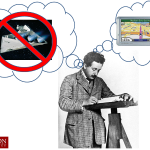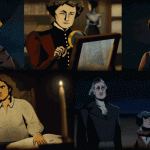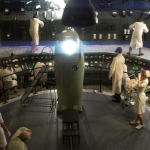In the Media
I get a fair number of books to review, but I'm often pretty bad about writing them up in a timely manner. Of course, most of them are well over 70 pages long, which is why I've managed to turn around Roberto Trotta's The Edge of the Sky: All You Need to Know About the All-There-Is in the course of a weekend.
As you can probably get from the title, this is a book about astronomy written in Up Goer Five style, using only the thousand most common English words (which are helpfully listed near the start of the book, in case you want to check whether he cheated...), plus proper names. And there'…
After a long absence due to travel (some of which is discussed), Uncertain dots returns!
Rhett and I talk about recent travels, how people going into internet-based physics outreach these days would probably do better to make videos than blog, physics in science fiction, celestial navigation, and as always, our current courses.
Some links:
-- Our Eratosthenes measurement from 2012.
-- Divided by Infinity, the best Many-Worlds story ever.
-- Ted Chiang's "Story of Your Life" isn't legitimately available online, but there's a spoilery Wikipedia page about it.
-- An old post where I talk about…
I didn't write a summary of the third day of "Quantum Boot Camp" to go with my Day One and Day Two summaries for a simple reason: I would've needed to do that on Saturday, and I spent Saturday in transit back to the US. More than that, though, it was harder to summarize than the other two days, because my talk was the middle of three, and thus I spent most of the first talk fiddling with my slides and fretting, and most of the third fighting off the post-talk adrenaline crash.
Happily, Sedeer at Inspiring Science offers a summary of the first two talks, namely Larus Thorlacius from Nordita…
The second day of the "Quantum Boot Camp" was much lighter on talks. The only speaker was Ray Laflamme from the Institute for Quantum Computing in Waterloo, who gave a nice introduction to quantum technologies. While he did spend a bit of time at the start going through Shor's algorithm for factoring numbers (following up a discussion from Wednesday), he mostly focused on ways to use quantum physics to improve sensors of technological interest.
So, for example, he talked about how efforts to develop techniques for error-correcting codes in liquid state NMR quantum computing led to the…
Our little hangout thing is now old enough to drink, in episode-years anyway, and to celebrate, we finally figured out how to get live audience feedback during the hangout. Which takes the first couple of minutes of the video, because we're highly trained professional scientists.
Once we got that sorted, we talked about a bunch of stuff, including but not limited to crazy space drives, the history of major concepts in physics, space probes and asteroids, and "native advertising" and how it relates to blog history. Some links:
-- My post on the impossible space drive, which has links to…
I should really know better than to click any tweeted link with a huff.to shortened URL, but for some reason, I actually followed one to an article with the limited-reach clickbait title Curious About Quantum Physics? Read These 10 Articles!. Which is only part one, because Huffington Post, so it's actually five articles.
Three of the five articles are Einstein papers from 1905, which is sort of the equivalent of making a Ten Essential Rock Albums list that includes Revolver, Abbey Road, and the White Album. One of the goals of a well-done list of "essential" whatever is to give a sense of…
This Alberto Cairo piece on "data journalism" has been kicking around for a while, and it's taken me a while to pin down what bugs me about it. I think my problem with it ultimately has to do with the first two section headers in which he identifies problems with FiveThirtyEight and Vox:
1. Data and explanatory journalism cannot be done on the cheap.
2. Data and explanatory journalism cannot be produced in a rush.
The implication here is that "data and explanatory journalism" is necessarily a weighty and complicated thing, something extremely Serious to be approached only with great care.…
Also coming to my attention during the weekend blog shutdown was this Princeton Alumni Weekly piece on the rhetoric of crisis in the humanities. Like several other authors before him, Gideon Rosen points out that there's little numerical evidence of a real "crisis," and that most of the cries of alarm you hear from academics these days have near-perfect matches in prior generations. The humanities have always been in crisis.
This wouldn't be worth mentioning, but Rosen goes on to offer an attempt at an explanation of why the sense of crisis is so palpable within the humanities, an explanation…
As noted earlier, I was a guest on the Read Science! hangout on G+ earlier today. If you weren't able to watch it live, the video is available at that link, and I'll embed it here:
There were some feedback problems with the audio for a little while-- annoyingly, it only got bad once the hangout went live-- there was a tiny echo when we were talking about logistics beforehand, but not enough to justify screwing around with earbuds. then when we started the actual event, it suddenly got completely awful for a while. It does get better, though-- I have no idea why, but later on, the echo is…
Rhett and I haven't done Uncertain Dots for a couple of weeks due to scheduling issues, but that doesn't mean I'm neglecting the multimedia side of things. In fact, I'll be doing a hangout today, as a guest on the Read Science! hangout hosted by Joanne Manaster and Jeff Shaumeyer. The event page is here.
I've also got four summer research students to supervise this year, who quite reasonably expect a fair bit of my time (thus the blog silence this week), and thus I'll be doing this from my office on campus, which means Emmy isn't going to be joining in. Alas. Odds are good that I'll have to…
The Cosmos reboot season finale (or possibly series finale; not sure if they're trying for a second set of episodes) was last night, but I wasn't able to take part in the live-tweeting of it thanks to a super-restless Pip who didn't drop off until 9:30 EDT. I suppose I could've waited to start the DVR until I would synch up with the West Coast showing, but then, I also need sleep. and I greatly enjoyed being able to fast-forward through the innumerable commercials.
And, really, if you want the story of the Cosmos reboot in a nutshell, there's no better capsule summary than the treatment of…
I don't have anything all that new to say about last night's Cosmos reboot, and I'm leaving for scenic Madison, WI today to attend DAMOP, so I don't have a great deal of time. Kate did mention something over dinner last night, though, that's a good topic for a quick blog post.
Kate's a big listener of audiobooks and podcasts, including The Naked Scientists podcast, and she mentioned something they said in responding to a question about charging phones and the cost of electricity:
I think my favourite one is a microwave oven. So, the clock on a microwave oven uses more electricity over the…
While solo-parenting Sunday night, I still managed to get free of The Pip just barely in time to catch the start of Cosmos. This was a strange episode in a couple of ways, chiefly having to do with the selection of topics.
For one thing, there's no small irony in the fact that following a couple of weeks in which host Neil deGrasse Tyson has been raked over metaphorical coals for dismissing philosophy as pointless because it doesn't lead to testable predictions, a big chunk of the episode was given over to wildly impractical speculations about panspermia and related topics. I realize it's…
A couple of weeks ago, io9 ran a piece about the old accusations that Robert Millikan manipulated his data for the electron charge with the headlineDid a Case of Scientific Misconduct Win the Nobel Prize for Physics? that got a lot of attention. I wasn't as impressed with this as a lot of other people, mostly because it's mostly just adding a clickbait headline to a story that's been around for decades, and doesn't even really engage with the various responses and defenses of Millikan, including this PDF that offers a (to my mind) fairly convincing argument that most of the argument turns on…
Last night's episode of the Cosmos reboot focused on one of the three physicists whose pictures Einstein kept in his office: Michael Faraday. I'm a big fan of Faraday, who famously started his career as a bookbinder's apprentice reading the books brought into the shop, and ended as one of the greatest experimental physicists of the 19th Century. Also, he had magnificent sideburns, as you can see in the picture. It's a great story-- I highly recommend his biography-- and pretty much the entire episode was devoted to Faraday, with only a surprisingly tenuous astronomy connection at the end,…
I have a couple of things in the mental queue for this week, but I'm still playing catch-up from my trip to Texas, so instead you get a really quick comment on last night's Cosmos. This one was all about the history of the Earth-- continents moving, climate changing, mass extinctions-- stuff that I know in outline, but not detail. It was, by and large, far enough from my areas of expertise that I can't say much.
I did think that some parts of it were a little too pat, though. These fall into two categories: just-so stories, and things obvious in hindsight. The former includes the very…
Below you'll find the slides from my Physics Day presentations at Space Center Houston, embedded via SlideShare. I was doing the TED-style minimal text thing, so they're probably not all that comprehensible on their own.
The event was supposed to have a pop-culture connection, so I decided to use space travel and extrasolar planets as a hook for talking about relativity, thus all the movie images near the beginning. The original idea I had was to look at different fictional ways of evading the ban on faster-than-light travel, but they wanted something more in the half-hour range than the hour…
Back when the first episode of the Cosmos reboot aired, somebody put together a composite of the cartoon people who flashed on screen, and we played a guessing game on Twitter. The image above is from a blog post by Meg at True Anomalies, and I think it was probably her, but the ephemeral nature of Twitter makes it annoying to track down the original discussion.
Anyway, we collectively got four of the five right: ibn al-Haytham in the upper left, Annie Jump Cannon in the middle top, Isaac Newton on the lower left, and William Herschel on the lower right. Well, five of six, if you include…
The finalists for the 2014 "Flame Challenge" have been selected, three written entries and three visual entries. None of these is my entry, alas, but it was worth a shot.
I watched the videos last night, and it was sort of interesting to compare what ended up working well with the test audience of 11-year-olds to the comments that I got. The main difference between what I did and what got picked wasn't so much in the use of unfamiliar words (the thing that generated comments on my post), but in the use of 11-year-old humor. (To be honest, I kind of hate one of them, because it overdoes the…
I'm not really a comic-book guy, but I've watched a bunch of comic-book movies recently. Kate was really fired up for the new Captain America movie, so I finally got around to watching the first one as background for that, then when I was sleep-deprived last week I watched the second Thor movie via on-demand cable, then Sunday evening Kate and I went to see Captain America: The Winter Soldier in the theater (her second time watching it-- she's really fired up).
Mostly, this has served to confirm that I'm not a comic-book guy. I'm just not invested enough in the idea of a movie about these…




